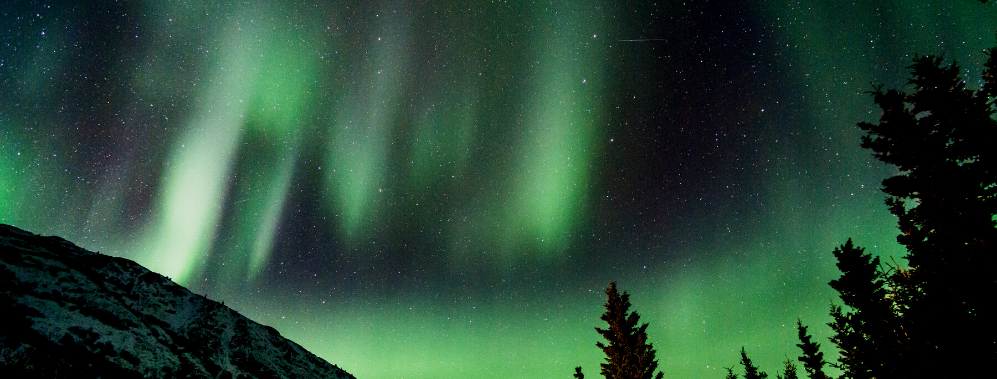
Understanding our planet through aurora
An NREN case study by Cybera
People have been intrigued by the majesty of the Aurora Borealis for thousands of years. Far from just a beautiful atmospheric phenomenon, auroras help us model and predict space weather, understand the earth’s magnetosphere, and experiment with plasma physics.
Through decades of aurora research, we have uncovered a treasure trove of scientific information about the Earth, space, and the interface between the two, including what we lose from our atmosphere into space, and vice versa. This research is fueled by hundreds of cameras and sensors throughout northern Canada that monitor the skies, with continual data collection each and every night. Because of the sheer volume of data involved, a huge challenge is collecting and distributing this data to researchers. For this, scientists at the University of Calgary have created the AuroraX project to collect and categorize massive amounts of aurora data. This project relies on Cybera, which operates Alberta’s Research and Education Network, and the NREN.
What is the NREN?
The National Research and Education Network (NREN) is an essential collective of infrastructure, tools and people that bolsters Canadian leadership in research, education, and innovation. CANARIE and its thirteen provincial and territorial partners form Canada’s NREN. We connect Canada’s researchers, educators, and innovators to each other and to data, technology, and colleagues around the world.
Massive data collection and dissemination
In 1998, a single camera installed by the University of Calgary in Gillam, Manitoba, took a low-resolution picture of the Aurora Borealis once a minute. Today, AuroraX collects data from dozens of cameras and sensors in a variety of dark sky locations across the Canadian North, with more than 40,000 real-time data streams. This massive data set routinely transfers terabytes of information, and is the largest user of network traffic on the University of Calgary campus.
The AuroraX scientists are dependent on Cybera’s high-speed network not only for its impressive bandwidth but also for its ability to reliably extract data from remote sites throughout the North – a feat previously impractical. Augmenting the ground-based aurora sensor data is input from instrumentation installed on satellites and spacecraft by the University of Calgary and other organizations. All of this data provides AuroraX with a rich multi-faceted window into our space environment.
Supporting global research
Collecting data about the Northern Lights, however, is meaningless unless it gets used. Thankfully, AuroraX makes all of its data available to hundreds of researchers. These include researchers from academic institutions across Canada, as well as scientists at the Canadian Space Agency, NASA, the European Space Agency, and the Chinese Academy of Sciences, among many others. In this way, Cybera and Canada’s NREN enable the AuroraX data to enrich important research efforts around the globe.
Unique Canadian role
Predicting space weather is critical for maintaining the satellites that our modern technology depends on. But the benefits of aurora study don’t stop there. Understanding the Aurora Borealis allow us to comprehend seemly unrelated subjects, like the formation and evolution of ocean currents, how pollution moves around the planet, even the behavior of bees who use the Earth’s magnetic field to navigate. This, in turn, helps us understand our place in the Universe, and allows us to safely explore our solar system. AuroraX also allows researchers to engage with fellow scientists through a common love of the amazing northern sky and a desire to uncover new phenomena.
With a large landmass directly under the aurora, the scientific infrastructure and NREN to support its study, and teams of dedicated researchers delving into its fundamental nature, Canada has become an exceptional contributor to the world’s scientific knowledge of geospace.

